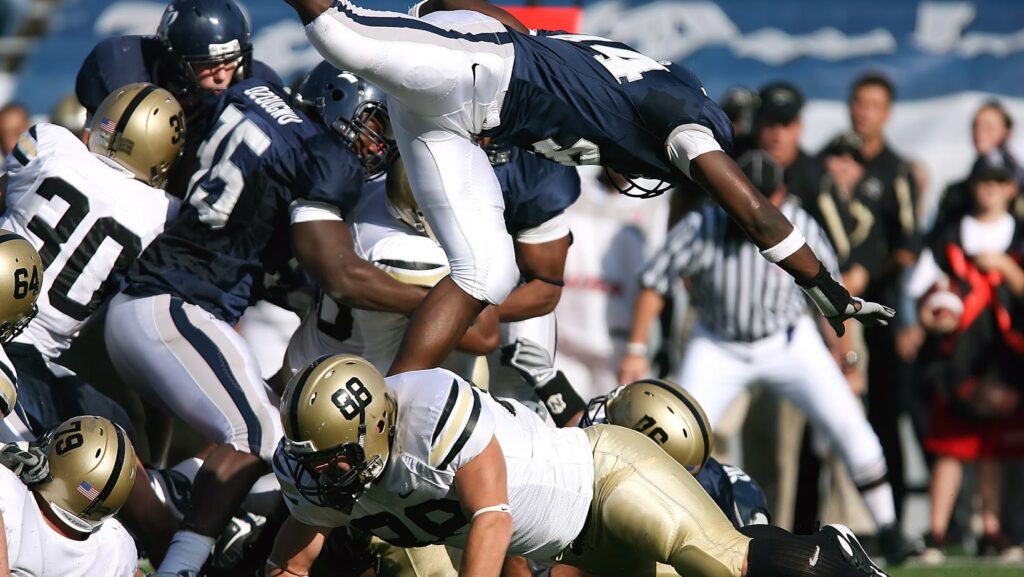Michigan’s football legacy isn’t just about the players. It’s a tale intricately woven with the strategies, triumphs, and trials of its coaches. This article delves into the rich history of Michigan football coaches, the architects behind the Wolverines’ success on the gridiron.
From the early days of Fielding H. Yost to the contemporary reign of Jim Harbaugh, Michigan’s football history is studded with coaching legends. Their leadership has helped shape the team’s identity, contributing to its status as one of the most successful college football programs.

Michigan Football Coaches History
As an integral part of the Wolverines’ legacy, Michigan football coaches have etched their names into sports history by guiding the team through uncharted territories to achieve great success.
The Early Years: Setting the Stage
In the early years of Michigan football, the coaches played a vital role in laying the foundation which would dictate the team’s future direction. Embracing an innovative approach, Michigan’s first coach, Mike Murphy, set the ball rolling. Though his tenure was brief, lasting from 1891 to 1893, Murphy’s coaching methods left an indelible mark. The first truly transformative coach at the helm was Fielding H. Yost. Taking up the reins in 1901, Yost not only debuted with an undefeated season but also set the stage for a dominant period now known as the “Point-a-Minute” era, a feat later recognized by the National Football Foundation Hall of Fame.
Transformation Periods: Key Coaching Changes
Several churns in the coaching structure marked the transition periods of Michigan Football. In 1948, Bennie Oosterbaan took charge, driving the team to secure a national championship in the first year, demonstrating the effectiveness of his driving leadership. The 1969 appointment of the legendary Bo Schembechler marked the advent of another dominant era. Coaches like Gary Moeller and Lloyd Carr further carried on Schembechler’s legacy. Carr led the team to victory in the 1997 national championship, reflecting the permanency of Schembechler’s influence.

Impact of Coaching on Team Performance
Success in Football, notably for Michigan, is directly tied to effective coaching. Coaches, like Murphy, Yost, Schembechler, Rodriguez, Hoke, and Harbaugh, molded the game, leading to victories and creating an enduring legacy.
Championships and Key Victories
Coaches’ strategies at Michigan have resulted in critical victories. Fielding H. Yost, for instance, guided Michigan to six national championships from 1901 to 1926, revolutionizing football with the introduction of the forward pass. More recently, Bo Schembechler secured 13 Big Ten titles during his tenure from 1969 to 1989.
Their strategies, though varying in style, all focused on achieving victories, a philosophy ingrained in Michigan’s football culture to this day.
Development of Player Talent and NFL Prospects
Successful coaching is also reflected in player development. Under their guidance, players at Michigan have achieved vast improvements. Coaches have created top-tier NFL prospects, including Tom Brady, who played under coach Lloyd Carr, leading Michigan to a national championship in 1997.
Under coach Jim Harbaugh’s tenure, starting in 2015, Michigan produced 21 NFL draft picks as of 2021, showcasing the effectiveness of contemporary coaching strategies in fostering NFL-ready talent.
The impact of coaching on team performance at Michigan is immeasurable. Coaches have not only led the team to victories but also developed world-class players that continue to uphold the legacy of Michigan football.
A Profound Impact
Michigan football’s coaching history is one of tradition and innovation. It’s a story of influential figures like Murphy, Yost, Rodriguez, Hoke, and Harbaugh who’ve shaped the team’s success. Their ability to blend old and new tactics has been key to maintaining the team’s legacy while staying competitive in the modern game. Michigan football’s history isn’t just about victories and titles; it’s also about the profound impact of coaching and the legacy it continues to build.

